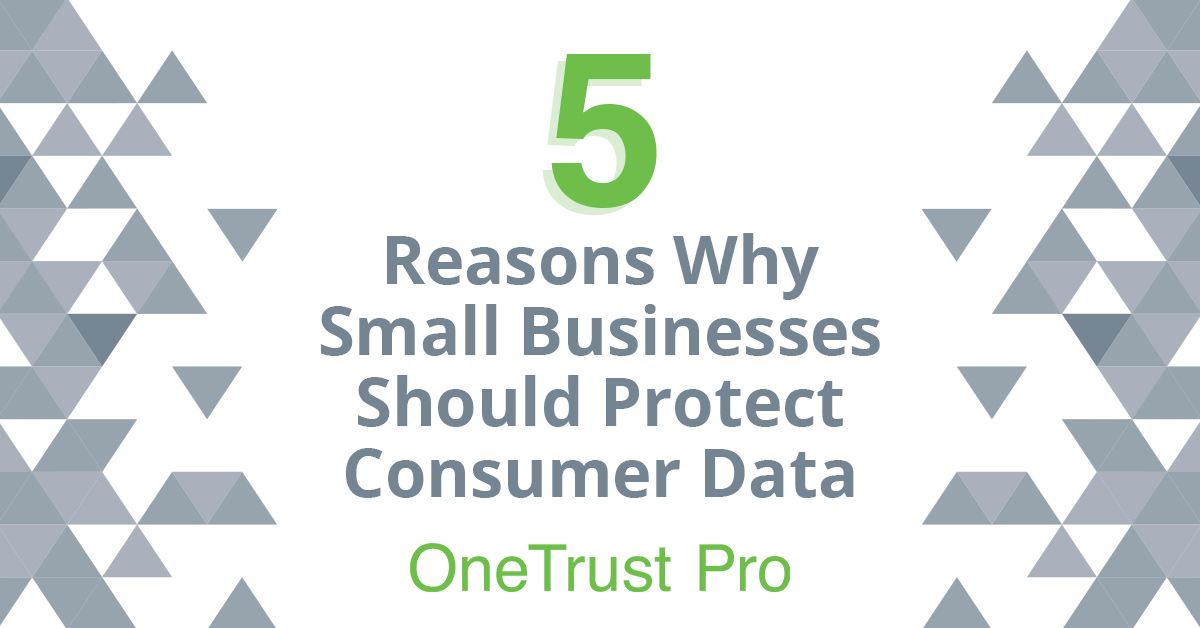Over the past year, global data protection laws have required businesses of all sizes to safeguard the data they collect. However, for small businesses, this may not be at the top of their to-do list. With the idea that data protection laws only apply to large enterprises, small businesses are not taking proactive actions to protect personal data. Data protection laws, like the GDPR, are changing how small businesses handle consumer privacy. As a result, small businesses must pay attention to data protection laws to proactively improve their data managing processes and further invest in secure privacy practices. As the conversation around consumer privacy continues to evolve, protecting personal data, so it maintains high ethical standards, both internally and externally, has never been more critical for small businesses and here are five reasons why:
Reason 1: Limits the Threat of Unauthorized Access
Some small business owners believe they are too small to be noticed by cybercriminals, but the truth is, they are one of the most attractive to hackers due to the perceived notion of unsecured data. With the growing concern around data security (or the lack thereof), small businesses must take steps to protect the consumer data they collect, store, and share across their business. Without proper security measures, small businesses are at risk of increasing internal and external incidents and causing accidental or malicious harm to their business and customers. Therefore, implementing best practices to protect customer data helps to make sure that all information is stored safely.
Reason 2: Decrease Risk of Data Breaches
Besides unauthorized access, personal data breaches also occur due to a lack of security and privacy practices — regardless of size. Security incidents can result from regular business practices and a variety of sources, such as insider threats, password attacks, in addition to the lack of time, resources, and know-how. These types of incidents can devastate small businesses and cause them to shut down due to reputational damage and the financial costs of resolving the situation. It’s in their best interest to make data security part of the routine to reduce the risk of becoming a victim of a breach. Small businesses that implement security controls decrease the number of incidents causing personal data breaches and avoid loss of reputation from customers and associated financial penalties.
Reason 3: Maintain Customer Trust and Brand Loyalty
As the conversation around data protection becomes prominent, customers are aware of how businesses use their information to deliver personalized products, services, and experiences. Over time they’ve grown to trust who they interact with and are comfortable sharing their data, but if trust between the two is compromised, business risks losing customer loyalty. A 2017 survey conducted by Baringa Partners found that “in the event of a data breach, 30% of people would switch providers immediately…” which will cause lower profits and fewer customers. With privacy protection programs, small businesses can reinforce their brand, build trust, and increase engagement through the buying cycle to make customers feel like their data is safe.
Reason 4: Builds a Positive Reputation and Business Continuity
A positive reputation takes years to build and minutes to destroy. One of the primary goals of any business is to build brand awareness and a positive reputation with their customers. While small businesses tend to avoid putting customers at risk, an unintentional or accidental data loss might impact their growing reputation. Whether it’s a cyber-attack, lost laptop, or an unhappy employee, small businesses can experience various incidents when their data isn’t protected or secured. As a result, they experience significant damage and not only risk losing the trust and loyalty of their customers but also jeopardize growth opportunities. Having a robust data security plan not only protects customer data and establishes business continuity, but also ensures risk mitigation when breaches occur.
Reason 5: Demonstrate Compliance with Global Data Protection Laws
Small businesses not only have an ethical and moral responsibility to keep customer data safe, but they are legally obligated to do so. Global and state-level data protection laws, such as the GDPR and CCPA, have outlined regulations that all businesses must follow to remain compliant. Although these laws may not directly target small businesses, they may soon require them to follow the same standards as a large enterprise organization. As a result, they should set up a data protection policy and proactively review and refine their data collection and storage process, along with their privacy and security plans to avoid serious consequences.
Proactively securing customer and company data and information will be crucial as governments around the world continue to roll out and develop new regulations. Small businesses will need to make sure they are ready to comply with global data protection laws to maintain their financial security, brand reputation, and future success. With OneTrust Pro, small businesses can and stay one step ahead with a privacy program that meets the requirements of new and existing global data protection laws.
Is your small business ready to comply with global data protection laws, like the GDPR? If not, do you wish you were? Start identifying gaps and building your compliance program today using the OneTrust Pro GDPR Readiness Worksheet and gain insight into how your company stands up against the GDPR framework.



